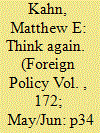|
|
|
Sort Order |
|
|
|
Items / Page
|
|
|
|
|
|
|
| Srl | Item |
| 1 |
ID:
088004


|
|
|
|
|
| Publication |
2009.
|
| Summary/Abstract |
still have the press credentials I gathered nearly three decades ago from the Middle East's various combatants: one from the left-wing Druse militia in Lebanon, one from the right-wing Lebanese Christian militia known as the "Phalange," one from the Palestine Liberation Organization, another from the Israeli government. The only common features are the photos of me in my early 30s: scruffy, glowering, determined to penetrate the veil of secrets.
The press cards remind me of a time when you could be in the middle of the Middle East conflict and imagine that you were covering all sides fairly. And when I say in the middle, I mean that almost literally. Back in the early 1980s, you could interview the PLO in West Beirut in the morning, sneak past the snipers along the "Green Line" at midday, and then interview the Israeli-backed Phalangists that afternoon in East Beirut, even as the two sides were shooting at each other.
|
|
|
|
|
|
|
|
|
|
|
|
|
|
|
|
| 2 |
ID:
088005


|
|
|
|
|
| Publication |
2009.
|
| Summary/Abstract |
S NIKOLAI KONDRATIEV SHIVERED before his executioners on a wintry Siberian morning in 1938, he could scarcely have imagined that, 71 years later, his name would be resurrected by a new generation of business theorists and management gurus seeking to understand the first Great Recession of the 21st century.
A prime mover behind Lenin's 1921 New Economic Policy, which briefly rehabilitated capitalism in order to save a young Soviet Union from imminent collapse, Kondratiev was an intellectual insurgent in a time and place where heresy could get one killed. Kondratiev theorized that economic activity took place in long waves: 50- or 60-year periods of creativity and growth followed by briefer contractions, after which the cycle would begin anew.
|
|
|
|
|
|
|
|
|
|
|
|
|
|
|
|
| 3 |
ID:
088006


|
|
|
|
|
| Publication |
2009.
|
| Summary/Abstract |
hen rapturous Germans tore down the Berlin Wall 20 years ago it symbolized far more than the overcoming of an arbitrary boundary. It began an intellectual cycle that saw all divisions, geographic and otherwise, as surmountable; that referred to "realism" and "pragmatism" only as pejoratives; and that invoked the humanism of Isaiah Berlin or the appeasement of Hitler at Munich to launch one international intervention after the next. In this way, the armed liberalism and the democracy-promoting neoconservatism of the 1990s shared the same universalist aspirations. But alas, when a fear of Munich leads to overreach the result is Vietnam-or in the current case, Iraq.
And thus began the rehabilitation of realism, and with it another intellectual cycle. "Realist" is now a mark of respect, "neocon" a term of derision. The Vietnam analogy has vanquished that of Munich. Thomas Hobbes, who extolled the moral benefits of fear and saw anarchy as the chief threat to society, has elbowed out Isaiah Berlin as the philosopher of the present cycle. The focus now is less on universal ideals than particular distinctions, from ethnicity to culture to religion. Those who pointed this out a decade ago were sneered at for being "fatalists" or "determinists." Now they are applauded as "pragmatists." And this is the key insight of the past two decades-that there are worse things in the world than extreme tyranny, and in Iraq we brought them about ourselves. I say this having supported the war
|
|
|
|
|
|
|
|
|
|
|
|
|
|
|
|
| 4 |
ID:
088008


|
|
|
|
|
| Publication |
2009.
|
| Summary/Abstract |
No way. Vowing to pump $150 billion into green technology over the next decade, U.S. President Barack Obama has made big promises about his environmental agenda. "It will also help us transform our industries and steer our country out of this economic crisis by generating 5 million new green jobs that pay well and can't be outsourced," he said in November.
British Prime Minister Gordon Brown has similarly called for an international "Green New Deal" to create a "low-carbon recovery." The United Nations wants a full 1 percent of global GDP to go to environmental initiatives. Rich countries such as Canada, Japan, and South Korea are obliging, spending billions to promote ecofriendly projects and green businesses.
|
|
|
|
|
|
|
|
|
|
|
|
|
|
|
|
| 5 |
ID:
088007


|
|
|
|
|
| Publication |
2009.
|
| Summary/Abstract |
he economic crisis has spawned a resurgence of interest in Karl Marx. Worldwide sales of Das Kapital have shot up (one lone German publisher sold thousands of copies in 2008, compared with 100 the year before), a measure of a crisis so broad in scope and devastation that it has global capitalism-and its high priests-in an ideological tailspin.
Yet even as faith in neoliberal orthodoxies has imploded, why resurrect Marx? To start, Marx was far ahead of his time in predicting the successful capitalist globalization of recent decades. He accurately foresaw many of the fateful factors that would give rise to today's global economic crisis: what he called the "contradictions" inherent in a world comprised of competitive markets, commodity production, and financial speculation.
|
|
|
|
|
|
|
|
|
|
|
|
|
|
|
|
|
|
|
|
|